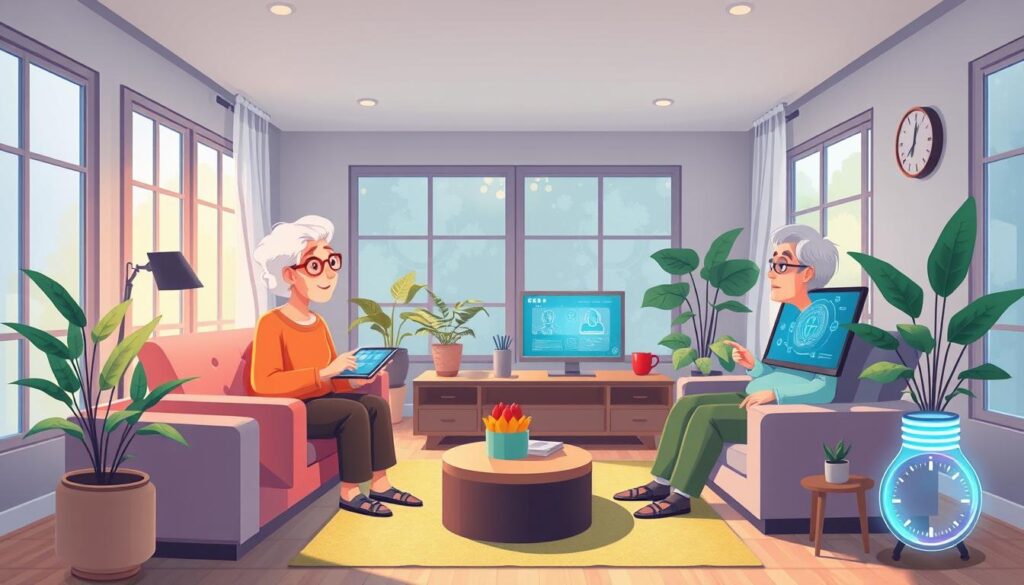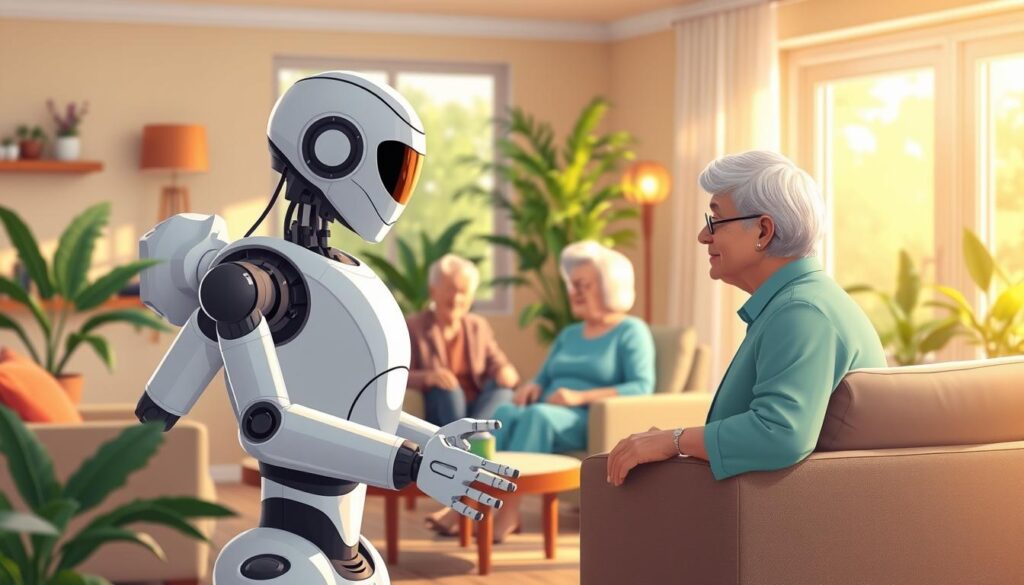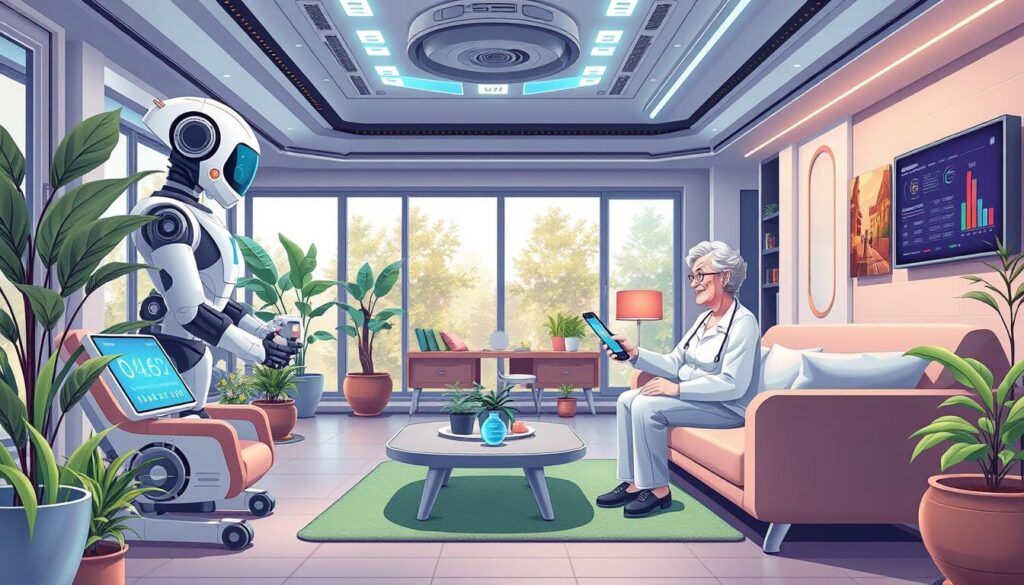The U.S. is getting older fast, with over 70 million baby boomers and 65 million Gen Xers reaching retirement age. This makes finding new ways to improve senior care more urgent than ever. But what if artificial intelligence (AI) could change the game for retirement living?
Could AI-powered technologies really make a big difference in the senior care industry? They might just improve the lives of older adults in ways we can’t even imagine yet.
AI is already changing senior living communities in big ways. It’s bringing in things like telehealth for remote medical checks and smart home systems for safety and independence. These changes are making retirement living better than ever before.
But how big of a deal is this really? Are you ready to see how AI is changing senior care for the better?
Debunking Myths: Seniors Embrace AI Adoption
Many older adults are excited about artificial intelligence (AI) technology. Senior technology adoption is growing fast. AI is changing how seniors get information, talk to others, and handle everyday tasks.
Overcoming Ageist Assumptions about Technology
Some think older adults find it hard to use new tech. But, studies show AI awareness and usage is rising among those 65 and older. Seniors are showing they can learn and do well in the digital world, just like younger people.
AI Applications Enhancing Convenience and Companionship
AI-powered convenience for older adults is making daily tasks easier. It helps with things like managing medicine and getting personalized advice. AI companionship for seniors is also becoming popular. Virtual assistants and chatbots can chat, play games, and offer support to fight loneliness and boredom.
We must not assume things about our aging users as AI leaders. By combating ageist assumptions and seeing AI’s potential, we can help seniors live better, more connected lives.
The Role of AI in Personalized Medical Care
Seniors are now using modern tech like AI-powered wearables and remote monitoring devices. These tools change how they get healthcare. They let doctors keep an eye on their health without needing to see them often.
This makes life easier for seniors. It also helps doctors give care that fits each person’s needs. This is called personalized healthcare for older adults.
Wearables and Remote Monitoring for Continuous Care
The use of AI in senior medical care and remote monitoring technologies is a big step forward. These systems collect health data like vital signs and how well they take their medicine. This helps doctors catch problems early.
Seniors can stay in their homes longer and feel more independent. Doctors can also give care that’s more suited to each person’s needs.
Combating Social Isolation with AI Companions
The number of seniors in the United States is growing fast. This has made social isolation a big problem. Before COVID-19, about one-quarter of seniors felt isolated. During the pandemic, this number jumped to 56%.
Artificial intelligence (AI) is a promising solution. It offers AI-powered companionship for seniors and alleviates loneliness in older adults.
The ElliQ system, made by Intuition Robotics, is a great example. It’s a $250 desktop robot with a $30 monthly fee. It has 800 sensors and helps with tasks like sending messages and reminders.
It also talks to seniors, plays games, and gives personalized advice. This way, ElliQ helps combat social isolation and boosts mental health.
As AI solutions for social isolation get better, they’re changing seniors’ lives. AI-powered assistants and robots bring more social interaction and independence. This improves their quality of life.
Promoting Mental Wellness Through Personalized AI
As we get older, keeping our minds healthy is key. Luckily, AI is changing how seniors can enjoy personalized brain games. Therapeutic AI, like LUCID’s music, can make seniors feel better by understanding and adjusting to their likes and feelings.
Therapeutic AI for Cognitive Engagement
AI-driven mental wellness for seniors helps keep older adults sharp and active. Personalized AI for cognitive stimulation makes activities fit each person’s interests and skills. This makes them feel needed and happy, fighting off loneliness and memory loss.

Looking ahead, therapeutic AI for older adults promises a brighter future. Seniors will stay mentally fit and emotionally strong, thanks to technology that’s made just for them.
Next-Gen Retirement Living: How AI is Transforming Senior Communities
The future of senior care is changing fast with AI technology. Older adults can now live more independently and comfortably. This is thanks to new AI solutions like smart home tech and AI-based medication systems.
AI-Enabled Independence and Medication Management
AI virtual assistants help seniors remember to take their meds and keep appointments. They also give advice on managing health issues. This tech lets older adults take charge of their health, boosting their independence and happiness.
Smart Home Systems for Safety and Emergency Response
AI-powered smart homes make living safer for seniors. These systems learn and adapt to each person’s needs, improving their quality of life. They also quickly alert emergency services in case of falls or accidents, adding extra security.
As AI keeps getting better, retirement living will become even more personalized and safe. Seniors can look forward to living in AI-enabled communities with smart home technology for their safety.
Balancing AI Innovation and Human Compassion
The senior care industry is changing fast with the help of artificial intelligence (AI). It’s important to keep a balance between new tech and the caring touch of humans. AI can make life easier and more personal for older adults. But, the caring side of caregiving is something only humans can do.
Designing AI Products with Seniors in Mind
To make AI really help older people, we need to involve them in the design process. Design AI products with seniors at the table at every process step. This way, we create solutions that fit their lives and meet their needs. It makes the products better and builds trust with seniors.
AI leaders should aim to keep the caring side of caregiving in their tech. Balance AI innovation with the human touch. This way, we can bring in new tech that helps, not replaces, the care from humans. It makes seniors’ lives better and more fulfilling.

As the senior care world keeps changing, we must keep seniors involved in AI development. Incorporate seniors’ perspectives in AI development. This way, we make sure AI helps, not hurts, the caring side of caregiving. It ensures older adults get the care they need and deserve.
The Future of Long-Term Care: AI Integration
The aging population is growing fast. Artificial intelligence (AI) in senior care is a game-changer. It can greatly improve the lives of older adults and their caregivers. AI is set to revolutionize long-term care, making it better for everyone.
Facilitating Aging in Place with Home AI Technology
Since 2020, the need for home care has skyrocketed. This is due to an aging population, a preference for home care, and global health issues. AI can help seniors stay in their homes longer, thanks to technologies that monitor health and assist with daily tasks.
AI Avatars and Robotic Assistants for Companionship
AI companions can fight loneliness among seniors. These AI friends can talk, remind of appointments, and help with daily chores. They offer support and ease the workload of human caregivers. As AI becomes more common in senior care, it will change how we support our elderly.
Conclusion
AI is changing senior care, making life better for older adults. It offers new ways to live independently and get the care they need. From watching health remotely to using smart homes, these techs are making a big difference.
As more baby boomers age, AI and robots will play a key role. They will help meet the needs of this tech-savvy group. This will make senior living better and more personalized.
AI leaders must focus on both tech and care. They should make sure seniors’ needs are met. This means creating easy-to-use systems that help older adults stay independent and happy.
The future of senior care looks bright with AI. It will bring more safety, convenience, and joy to older adults. With these advanced technologies, senior living can become a place where people thrive and live well.
Legal Disclaimer for AIover40.com
Welcome to AIover40.com. Please note that the information provided on our blog, including comments and insights, is intended for informational and entertainment purposes only. This blog is not a source of professional advice.
No Professional Advice
The content shared on this blog is designed to provide helpful information on the topics discussed. However, this blog does not provide professional advice and should not be used as a substitute for advice from a certified professional in the fields of artificial intelligence, finance, healthcare, or any other professional domain. The use of any information provided on this blog is solely at your own risk.
Accuracy and Completeness
While we strive to keep the information up to date and correct, we make no representations or warranties of any kind, express or implied, about the completeness, accuracy, reliability, suitability, or availability of the website or the information, products, services, or related graphics found on the website for any purpose.
Limitation of Liability
In no event will AIover40.com, its affiliates or its representatives be liable for any loss or damage including without limitation, indirect or consequential loss or damage, or any loss or damage whatsoever arising from loss of data or profits arising out of, or in connection with, the use of this blog.
Consent
By using our blog, you hereby consent to our disclaimer and agree to its terms.
